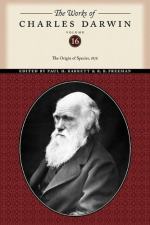Whatever the cause may be of each slight difference in the offspring from their parents—and a cause for each must exist—it is the steady accumulation, through natural selection, of such differences, when beneficial to the individual, that gives rise to all the more important modifications of structure, by which the innumerable beings on the face of this earth are enabled to struggle with each other, and the best adapted to survive.
CHAPTER 6. DIFFICULTIES ON THEORY.
Difficulties on the theory of descent with modification.
Transitions.
Absence or rarity of transitional varieties.
Transitions in habits of life.
Diversified habits in the same species.
Species with habits widely different from those of
their allies.
Organs of extreme perfection.
Means of transition.
Cases of difficulty.
Natura non facit saltum.
Organs of small importance.
Organs not in all cases absolutely perfect.
The law of Unity of Type and of the Conditions of
Existence embraced
by the theory of Natural Selection.
Long before having arrived at this part of my work, a crowd of difficulties will have occurred to the reader. Some of them are so grave that to this day I can never reflect on them without being staggered; but, to the best of my judgment, the greater number are only apparent, and those that are real are not, I think, fatal to my theory.
These difficulties and objections may be classed under the following heads:—
Firstly, why, if species have descended from other species by insensibly fine gradations, do we not everywhere see innumerable transitional forms? Why is not all nature in confusion instead of the species being, as we see them, well defined?
Secondly, is it possible that an animal having, for instance, the structure and habits of a bat, could have been formed by the modification of some animal with wholly different habits? Can we believe that natural selection could produce, on the one hand, organs of trifling importance, such as the tail of a giraffe, which serves as a fly-flapper, and, on the other hand, organs of such wonderful structure, as the eye, of which we hardly as yet fully understand the inimitable perfection?
Thirdly, can instincts be acquired and modified through natural selection? What shall we say to so marvellous an instinct as that which leads the bee to make cells, which have practically anticipated the discoveries of profound mathematicians?




